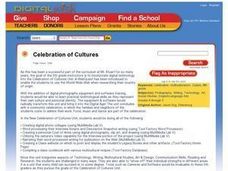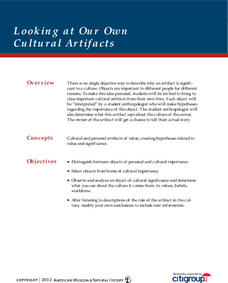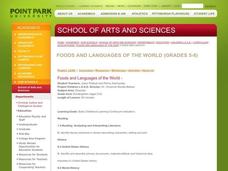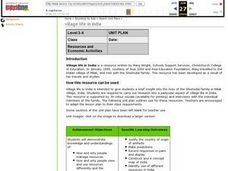Curated OER
Community Culture Trunk
Second graders examine the similiarities and differences between the various cultures represented in their class. After being read a story about immigration, they identify things they would have to bring with them if they were moving to...
Curated OER
Celebration of Cultures
Learners create a multimedia project to represent their own culture and personal identity. They design a personal Coat of Arms using a computer graphics program and digital camera, write a script and film an interview, and contribute a...
Curated OER
Native American Cultures for Grades 4-5
Students investigate Native American culture by researching the Internet. In this U.S. History lesson, students read online field reports about exploration and the history of Native Americans in the United States. Students...
Curated OER
Lesson Plan: Carving Through History
Peek into the art and history of ancient Mexico by analyzing the artifact Stone Serpent Heads. Learners examine images of the piece, discuss its origin, history, and significance. They experience the carving process by creating similar...
Curated OER
Introduction to Korea
Students explore the culture of Korea. In this Korean culture lesson, students examine visual and textual works regarding Korea. Students also examine dance, architecture, and food of the country.
Curated OER
Reading Artifacts
Learners explore and analyze categorizing objects, material culture artifacts, from a variety of perspectives, to consider the story behind each one. They research skills by assessing how to look at artifacts as cultural outsiders would....
Media Smarts
Defining Popular Culture
What part does media play in creating, defining, and perpetuating popular culture? High schoolers chart their encounters with fads, trends, and icons and reflect on the media's influence on popular culture.
Curated OER
What Do We Learn From the Repartiation of Alaska Native Artifacts?
Students observe and evaluate evidence of Alaska Native cultural symbols and artifacts. They research historical data from a variety of primary resources, including the Harriman expedition journals, related web sites, oral accounts,...
Teaching Tolerance
Identity Artifacts Museum
Who are you? It's a simple question, but younger learners have the opportunity to express their complex identities by making artifacts that represent parts of their identities. After engaging in the activity, they share who they are with...
Smithsonian Institution
Changing Gender Roles on the Home Front
Many historians discuss how gender roles changed because of World War II, but how did this come to be? An informative resource challenges scholars to do some digging and research the information for themselves. They research how...
Curated OER
Artifacts 1: What Can We Learn From Artifacts?
Sixth graders are introduced to artifacts and explore an online archaeological site to connect clues about how people once lived. In this deductive reasoning lesson, 6th graders participate in the stratigraphy game on Kids Dig...
Curated OER
Artifacts
Students examine different artifacts and determine the difference between personal and cultural objects. They collect items from their home of cultural importance as well. They identify all they can from artifacts they are given to analyze.
Curated OER
Foods and Languages of the World
Students study world cultures with an emphasis on languages and cultures. In this world cultures instructional activity, students study the countries of Spain, China, Italy, and the United States. Students read the story Everybody Cooks...
Curated OER
Japanese Objects as Cultural Artifacts: A Model Lesson Using Textiles
Learners complete a unit on the cultural significance of textiles in the Japanese culturre. They analyze cotton, line, silk, and wool fabrics, examine various fabric creation and decoration techniques, select an object and write a...
Curated OER
Natural Dyes From Plants
Students investigate how natural dyes from plants was an expression of Native American cultures. They examine objects dyed from natural sources, conduct Internet research, and create their own dyes using various plant sources.
Curated OER
Hidden Children
Eleventh graders explore, analyze and study a specific genocidal event in twentieth-century history, The Holocaust. They evaluate a variety of historical artifacts and synthesize the information gathered into their own in order to...
Curated OER
Village Life in India
Students use included links to research the lives of people living in a small village in India.
Annenberg Foundation
Mapping Initial Encounters
Picture someone's excitement of seeing a horse for the first time. How about a cow? The Columbian Exchange changed life for not only Native Americans, but also for Europeans and the entire world. The second lesson of a 22-part series...
Channel Islands Film
Telling Your Own Story
After watching and discussing a video on the Voyage of Cabrillo, individuals craft their own origin story and design and build an artifact they feel best represents their history.
Curated OER
What Culture Game?
Young scholars examine artifacts from ancient cultures. They compare the differences and some similarities that may exist . They decide on at least two artifacts per area for each of the three cultures chosen and explore diversity.
Curated OER
The Treaty Trail: U.S. - Clothing That Talks: Meaning and Material Culture
Students investigate the cultures of Native Americans and Euro-Americans through their clothing. In this photograph analysis lesson, students observe historic photographs and analyze the style of clothes people wore and how it...
Curated OER
PERCEIVINGT A CULTURE THROUGH ITS LITERATURE
Studentsexamine cultural values in literature, identify the cultural assumptions, prejudices, and purposes of authors and translators, use historical perspective to determine if the values and lifestyle depicted apply to contemporary...
Curated OER
Perceiving a Culture Through Its Literature
Young scholars read After Seventeen Years by Kim Yong Ik and discuss the cultural, political and geographical aspects of Korea that specifically affect the events in the story.
Curated OER
Sing Out Loud: The Slave Spirituals Historical and Cultural Implications during Reconstruction
Students identify, summarize and present facts about cultural, educational and political inequalities of Reconstruction, explain hidden codes of slave spirituals and their importance in slaves' communication, and create poetry based on...
Other popular searches
- Cultural Artifacts in Japan
- Math Cultural Artifacts
- Cultural Artifacts Diversity
- American Cultural Artifacts
- Cultural Artifacts in Alaska
- Us Cultural Artifacts
- Korean Artifacts and Culture
- Cultural Artifacts in Math
- Recyclable Cultural Artifacts

























